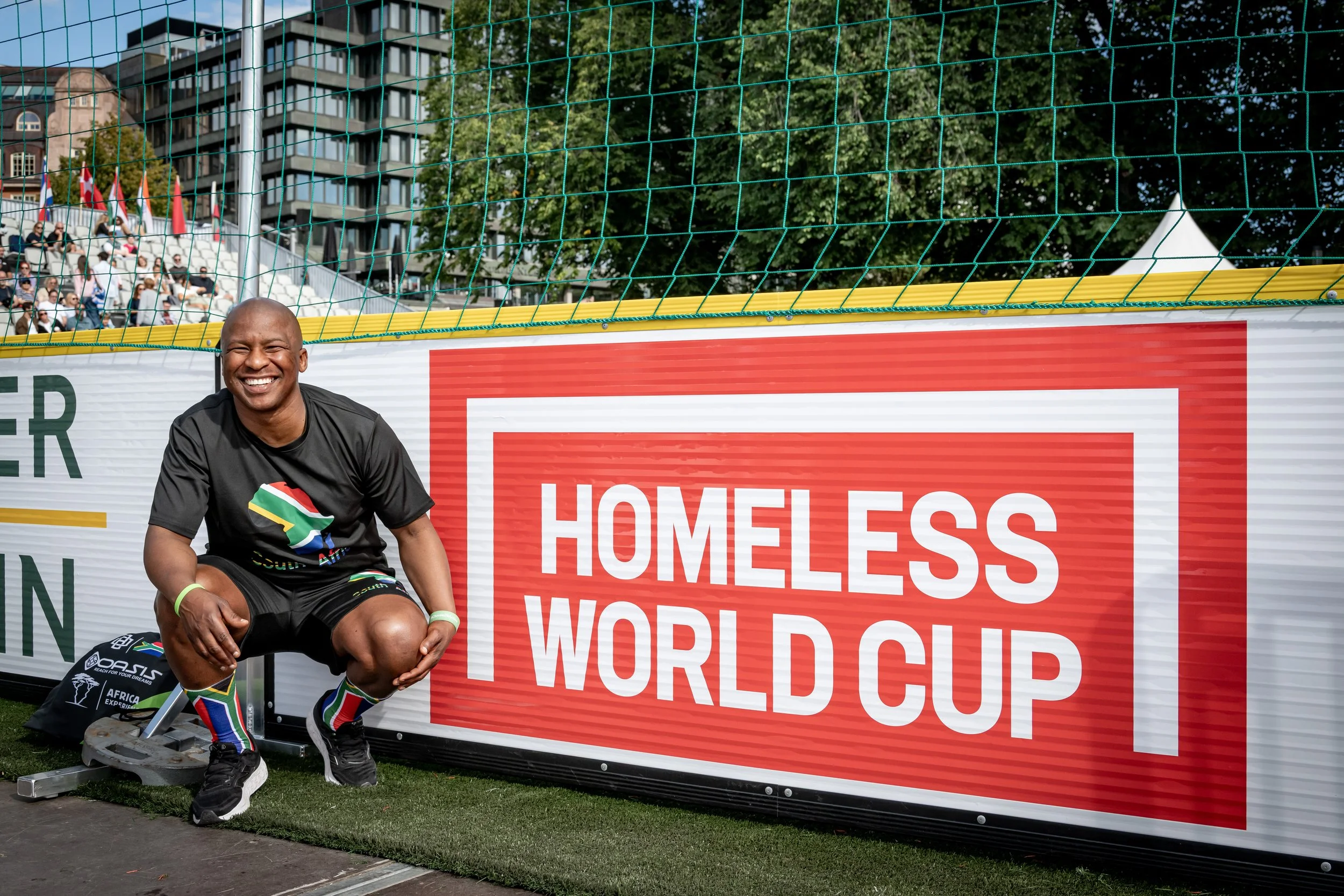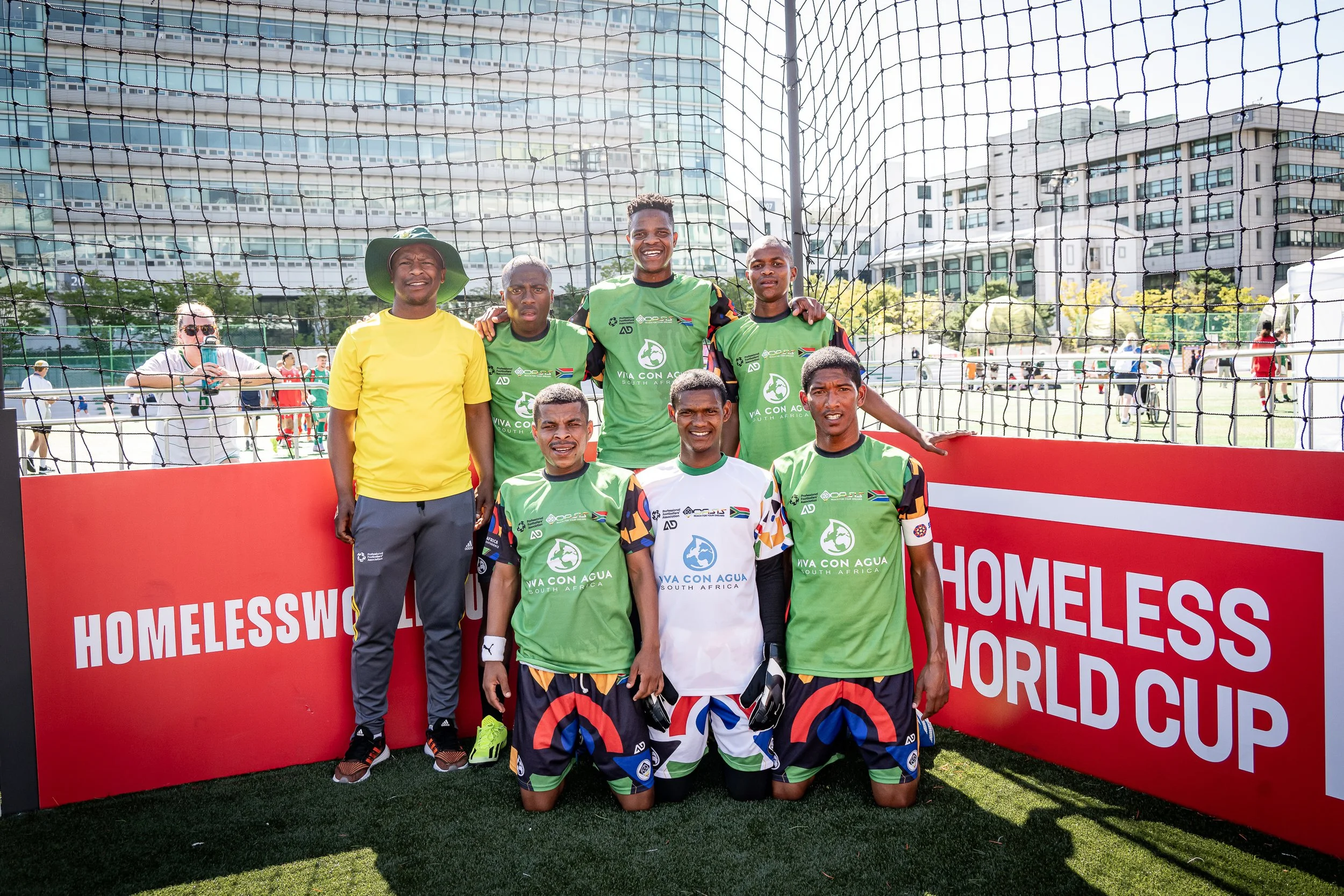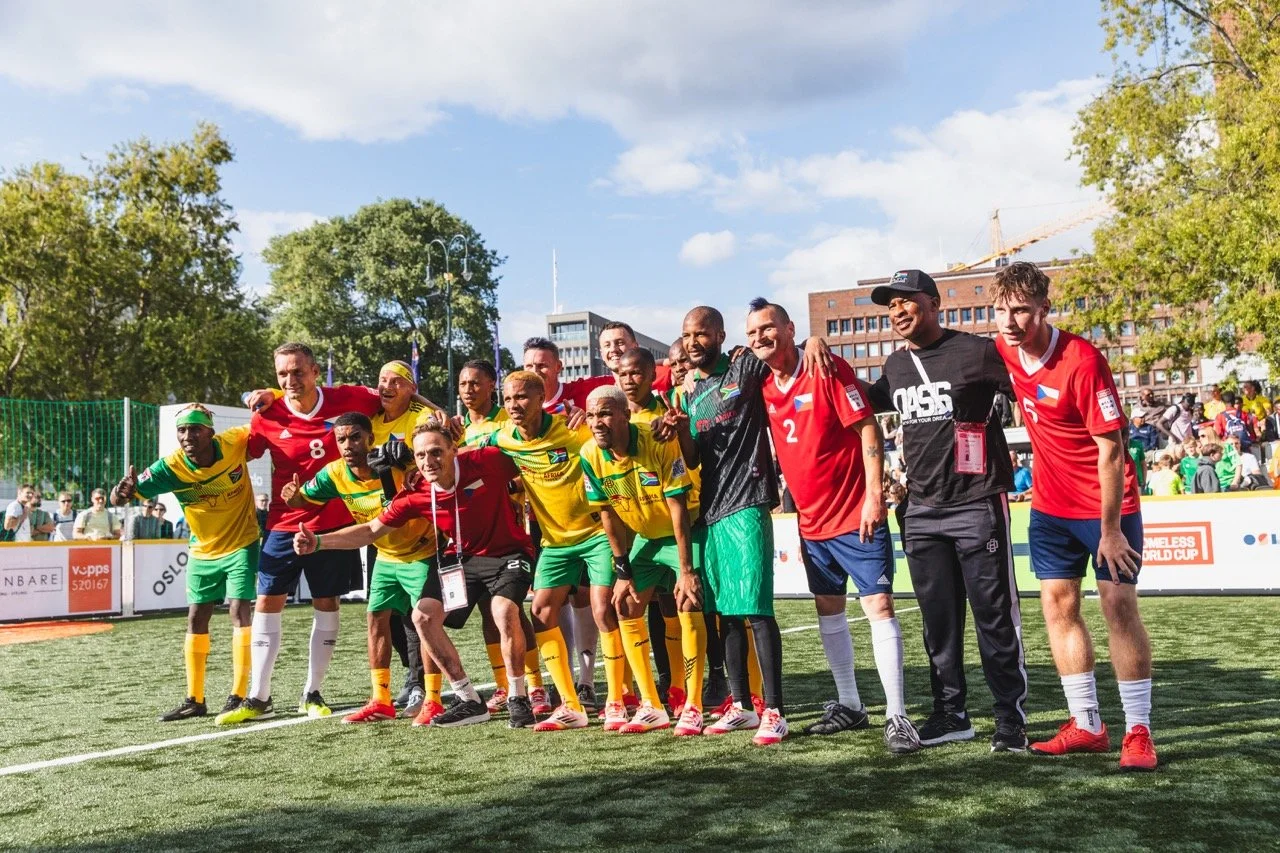The Beautiful Gain
From a player from a remote South African region who didn’t think anyone would have confidence in him in 2012 to an experienced facilitator and charitable organisation founder making the world better for those in his home town coming after him, South African Bongani ‘Bobo’ Mathiso’s trajectory is simultaneously remarkable and humbling.
He went from not expecting to be selected for the Homeless World Cup to overshooting that expectation and being selected as both player and captain. Mathiso subsequently moved into a support staff and coaching role and has been a staple in the South African team and tournament ever since. So much so that spent time in Italy filming for The Beautiful Game , a fictional account of an amalgam of real-life Homeless World Cup experiences which hit number in the Netflix charts last year and continues to win fans around the world.
That’s a lifetime away from how things started out for Mathiso, who hails from an area in South Africa’s Eastern Cape called Molteno. Situated approximately 12 hours’ drive from Cape Town and famous for being the region that both produced Nelson Mandela and Africa’s coldest temperatures, Molteno is a town with a little over 11,000 people. It’s also a community that is, due in large part to its remoteness and lack of attendant resources, fairly disadvantaged.
Mathiso and the South African team at the 2024 Homeless World Cup in Seoul, South Korea
Mathiso’s upbringing isn’t something he talks a lot about—he’s conscious that each player from the Homeless World Cup has experienced their own challenging equivalents. But his upbringing has nonetheless shaped him as a person and informs his current practice.
A formative experience was his daily school lunch break where he would return to the home where he was being raised by his grandmother knowing that, due to how little money they had and how far stretched it was, there would not be any food. “You would know for sure that during lunch time, there wouldn’t be anything to eat,” Mathiso explains. “But you would still go home for your 30-minute lunch break and return afterwards, pretending you’d eaten.”
“Life is very difficult compared to the cities like Cape Town, Johannesburg, in rural areas,” Mathiso continues. “If you want to see poverty, go to the rural areas in South Africa—that will give you the true reflection of how life is.” As an example, he mentions in passing that for more than a decade there wasn’t running water where he lived. “We had to carry water, walk a long distance to go and fetch water, and carry it back. This was in this millennium, the 20th century, you understand. Hence why I’m saying come and visit Molteno to see for yourself, because the story might sound difficult to comprehend—almost fictional.”
Mathiso had to move to Cape Town after his grandmother’s passing. “That’s where it all started,” he explains. “Since then I’ve never looked back. It was always my dream to come to the city to explore more opportunities and the variety of chances that can make me become a better person.”
Mathiso attended school in Cape Town from that time and in 2012 was invited down to Homeless World Cup trials by a friend who was a former player who had participated in the 2011 Homeless World Cup in Paris. That’s where Mathiso met Clifford ‘Cliffy’ Martinus, who runs the Cape Town-based OASIS organisation, which works with young men living on the streets or experiencing difficult circumstances within informal settlements. OASIS partners with the Homeless World Cup to bring a South African team to the Homeless World Cup each year.
Mathiso remains aware of the circumstances of his upbringing and feels a sense of urgency and importance to improve the circumstances for those coming behind him, particularly from regional areas such as Molteno. So, in addition to his work with OASIS, Mathiso has set up a complementary not-for-profit company in his home town.
Geleza Nge Diski is designed to address issues relating to youth health, poverty, and crime through the use of sport. The organisation provides school uniforms, stationery supplies, sanitary supplies, and scholarships for Molteno students. Through support the Jimmy Aggrey Foundation in collaboration with the Chelsea Foundation, it’s also been able to distribute some Chelsea football kit.
The not-for-profit holds an annual interschool tournament in town that includes a range of activities from football to netball to boxing to table tennis to chess to spelling bees. That balance of activities recognises that the philosophy is to learn through football, but also that as much as football can change someone’s life that someone also needs all the necessary support—football alone cannot do everything. It’s why Mathiso ensures physical and mental health imbued by football is complemented and bolstered by education.
“The tournament is more than a competition. It’s more about uniting schools through sport, and it teaches students how they can work together to better their education. It also teaches them the core values of life in terms of respect and learning from one another. It helps them to expand their thinking that in life it’s not always about you, because when they play, whatever they win it doesn’t necessarily have to go to the winners—it might go to someone else in the school. So they’re not playing for themselves. They’re playing for their schools. So it teaches them how they can help one another.”
Mathiso at the 2024 Homeless World Cup in Seoul, South Korea
When we speak, Mathiso is wearing a jersey with a player number marked on it in texta. It’s a subtle nod to the South African team’s experience in The Beautiful Game, where the team had to rely on cobbled together kit for the Homeless World Cup after their football kit didn’t arrive. What we see of the South African team on screen is a fairly accurate representation of the team’s experiences over the years. Visa and airport transfer delays and lost kit bags is part and parcel of the South African team’s international travel experience.
Mathiso was one of a number of said former players selected to feature in The Beautiful Game. Other selected players include 2014 US player Angela Draws. “They said it would be good if we can bring the ex-players,” Mathiso explains of how the filmmakers invited him to be part of the film. “We went there as South Africans.” What we as the audience see on screen is authentically them, including their fistpump- and goosebump-inducing singing. (Some teams win games. Some teams win hearts. Some teams win hearts and games. South Africa is one such team.) Much of that performance was improvised and organically incorporated into the film.
“[The director] would call me aside and say, ‘I like that part. Can you please sing it for me?’” Mathiso explains. “All the songs that we do sing—because we sing many songs—they have different meanings, but they also have a message behind that is kind of at times, ‘Let’s try to unite, we must never lose hope.’ There are many songs that also speak to us as Africans, how we should encounter or face the challenges on and off the field … That’s why we sing regardless of whether we win or we lose, because singing is how we revive our confidence, how we also encourage one another.”
South African team after their game with Czech Republic at the 2025 Oslo Homeless World Cup
Mathiso has returned to Norway for the 2025 Homeless World Cup where he’s coaching and mentoring another generation of South African Homeless World Cup players. His experience, alongside longtime coach and OASIS organiser Martinus, steadies and steers the team as it navigates the vibrant football tournament but also the vast cultural difference.
“The team looks good,’ Mathiso’s 2025 cohort. “It’s balanced but the players also come from different backgrounds. Remember, with South Africa we have nine provinces, 12 official languages with sign language.” So there’s some language barrier considerations, he explains. “But also with the power of football, it’s our universal language that has united us.”
Norway is, like Cape Town, a world away from Molteno both geographically and compared with the opportunities it presents. “Visiting different countries has taught me to look at things from a different perspective … that we shouldn’t be looking to each other as black, white, purple, green, or whatever.” His aim is living together peacefully and improving things for everyone, including expanding horizons. The Beautiful Game is helping with that.
“After the movie was released, one of my friends livestreamed The Beautiful Game to make sure Molteno residents were able to see it in my absence, since I’m currently residing in Cape Town. So it was more motivation and encouragement for them to see that one of their own within the district of Molteno can be seen on the international stage, Netflix, in a movie like The Beautiful Game, which speaks about our backgrounds, most of us who come from poor backgrounds. So it teaches them the importance of staying focused and how, irrespective of where you come from, you can make it in life.”
Words by Fiona Crawford |Photos by Anita Milas & John Anderson




